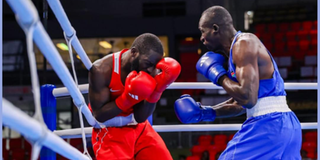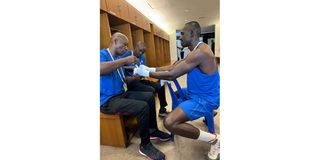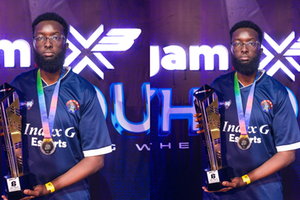
Edwin Okong'o of Kenya (right) stops Mohamadou Gory of Mali in the first round of their light heavyweight round of 64 at the Olympic qualifiers in Bangkok this week. Okongo later lost on points to Dalai Ganzorig of Mongolia in the round of 32.
When the final gong sounds at the 2024 Boxing Second World Qualification Tournament in Bangkok on Saturday, it may as well be the death knell for Kenya’s Olympic Games dreams.
For a country that made history by producing the first Olympic boxing gold medal in Africa through Robert Napunyi Wangila during the 1988 Seoul Olympic Games, this is the lowest ebb for the sport.
Wangila, who remains Kenya’s only Olympic gold medallist to date, died in 1994 after suffering injuries during a professional fight against David Gonzales in Las Vegas, United States of America.
In its heyday, the national boxing team that is popularly known as “Hit Squad” featured in all Olympic Games for over 60 years since 1964, and won seven medals.
But from Kenya’s performance at Bangkok’s Indoor Haurmark Stadium, the “Hit Squad” is now a pale shadow of its former self when it instilled fear among opponents.
Chances of a Kenyan boxer climbing onto the North Paris Arena in Roland Garros, where the Paris Olympic Games boxing tournament will be held, now seems a distant dream.
Even the rare opportunity for Kenyan boxers to train with revered Cuban boxers before the Olympic qualifications doesn’t seem to have done the team any good.
In the horrible Bangkokshow, so far, four Kenyan boxers have been knocked out. They are: bantamweight Amina Martha, middleweight Elizabeth Andiego, light heavyweight Edwin Okong’o and light-middle weight Boniface Mogunde.
With an outside chance of qualifying for the Olympics, heavyweight Peter Abuti and welterweight Friza Anyango will climb onto the ring on Wednesday night as Kenya’s final hope, but they will be up against more experienced opponents.
Abuti will fight Poland’s Mateusz Bereznick while Anyango will take on Emillie Sonvico of France.
If the two boxers are eliminated, then it means that for the first time since the 1964 Tokyo Olympic Games, there will be no Kenyan boxer at the Summer Olympic Games.
Kenya boycotted the 1976 Montreal Olympic Games and the 1980 Moscow Olympic Games for political reasons, but has entered boxers in all other Olympic editions from 1964.
“It has been a torturous 36 years now for Kenya without winning a medal in the Olympics, and things in Bangkok are not looking rosy,” said veteran boxing writer John Nene, who noted that apart from gold medallist Wangila, another Kenyan, Chris Sande, got a bronze medal in the middleweight category at the 1988 Summer Olympics in Seoul.
National Olympic Committee of Kenya (NOC-K) Secretary- General Francis Mutuku, said Kenya must find urgent solutions to arrest declining boxing standards.
“If you look at our Olympic Games success, boxing was our number two sport after athletics,” Mutuku said on Tuesday.
“The poor performance in Bangkok is a reflection of where our standards are in boxing. We must up our game. We have the talent. We need to develop it and we can bounce back strongly,” he said.
Mutuku said Kenya will not be entitled to “universality” places which are wildcard lifelines handed to athletes from underrepresented national Olympic committees (NOCs) with small delegations.
NOCs that participated with an average of eight athletes or less in individual sports at the 2016 Olympic Games in Rio de Janeiro and the 2020 Tokyo Olympic Games are eligible for the universality places.
“In the 2020 Tokyo Olympics we had 87 athletes and, therefore, we don’t qualify for the slots,” explained Mutuku.
Nine boxers — five women and four men — will be picked by the International Olympic Committee (IOC) for the universality slots. This will bring the total number of boxers to 248 (124 men and 124 women), in 13 weight categories for the Paris Games.
These quotas are allocated to eligible NOCs by the Olympic Games Tripartite Commission.
At least 35 African NOCs are eligible for universality places, alongside the Americas (18), Asia (17), Europe (9) and Oceania (14).
Retired boxer Peter “Dynamite” Odhiambo (light heavyweight), who participated in the 1996 Atlanta Olympic Games, said Kenya’s problem is poor investment in the sport.
“Africa doesn’t invest in referees and judges and youth development. Boxing officials have not upgraded to current international standards,” said the Nakuru-based former boxer.

From left: Kenya’s David Munuhe (deputy coach) and John Waweru (trainer) unwrap boxing hand wraps from Edwin Okong’o who lost on points to Dalai Ganzorig of Mongolia on Monday (May 27) in the round of 32 light-heavyweight contest at the Indoor Stadium Huarmark in the ongoing Olympic World Qualification Tournament in Bangkok, Thailand.
Another former international boxer, Stephen Muchoki, said Kenyan can only bounce back if the technical bench is revamped.
“We need former boxers in the technical bench of the ‘Hit Squad’ to give good advice,” said Muchoki, a retired light flyweight boxer
Muchoki, one of Kenya’s most successful boxers, won a gold and silver medal at the inaugural 1974 World Amateur Boxing Championships in Havana, Cuba, and in 1978 (Belgrade).
“I won three gold and two silver medals. This is because of proper guidance by veteran coaches Peter Mwarangu and Charles Anjimbi,” added Muchoki, who also won the 1974 Commonwealth Games light flyweight title in Christchurch, New Zealand, and in Edmonton, Canada, in 1978.
He also clinched a silver medal in the African Games, formerly the All-African Games, in Algiers in 1978.
The Kenyan bench in Bangkok is made up of Boxing Federation of Kenya (BFK) executive committee members who are doubling up as team technical officials. They are BFK treasurer Musa Benjamin, who is the head coach, deputy coach David Munuhe, who is the BFK’s secretary-general, and trainer John Waweru, the federation’s competition secretary.
“With this kind of technical bench in Bangkok, you’re likely to hear about poor officiating and bad judgement as the root cause of poor performance,” said Muchoki.
Some of the boxing coaches in Kenya are not happy with the technical bench in Bangkok.
“The technical bench is supposed to have independent members of the coaches’ commission alone.
“Even NOC-K is not happy with this technical bench that has no track record of producing champions,” said one of the coaches, who, like his colleagues, preferred anonymity so as not to be victimised by the federation.
“This technical bench of ‘Hit Squad’ in Bangkok is not interested in developing the game,” added another coach who also spoke on condition of anonymity.
A Kisumu-based coach (name also withheld for similar reasons) said: “It is high time the ‘Hit Squad’ technical bench is overhauled. The tragedy at BFK is that the coaches’ commission exists only on paper. Sports Cabinet Secretary Ababu Namwamba should intervene.”
Some coaches, who are not authorised to speak to the press, said the millions of shillings used to fund the Bangkok team should have been used to develop youth boxing.
A return flight from Nairobi to Bangkok using Kenya Airways costs between Sh70,000 and Sh130,000, and with 10 officials on board, that translates to between Sh700,000 and Sh1.3 million without including accommodation coast and allowances.
However, an official at NOC-K said the cost of the Bangkok trip was shared between Kenya and the IOC.
“The government catered for air tickets and other expenses while the IOC paid other expenses,” said the NOC-K official.
Kenya started the Olympic campaign on a sound note during the 1964 Tokyo Games with five boxers, led by the late Philip Waruinge (featherweight) who won a bronze medal.
The rest of the squad included John Olulu (light welter), John Oundu (light-heavy), John Kamau (flyweight) and Gichure Gakungu (welter).
During the 1972 Munich Olympic Games, Kenya had a squad of eight boxers. Waruinge (featherweight) and his brother Sammy Mbugua ( (lightweight) and Dick “Tiger” Murunga won bronze medals. Others were David Attan (light middle), Peter Dula (middle), Stephen Thega (heavyweight) and Felix Maina (light flyweight).
At the 1984 Los Angeles Olympic Games, Kenya featured 10 boxers with Ibrahim “Surf” Bilali winning a bronze medal after losing 5-0 to Redzep Redzepvoski of Yugoslavia in the opening round of their semi-final bout.
Other members were John “Duran” Wanja (feather), Sylvanus “Sulu” Okello (light-heavyweight), Daniel Mwangi (light flyweight), Sammy Mwangi (bantam), Charles Owiso (light welter, Stephen Okumu (light middle), Augustus Oga (middle), James “Demosh” (heavy) and Patrick “Mont” Waweru (lightweight).
During the 1988 Seoul Olympics, where Robert Wangila made history, Kenya’s “Hit Squad” had a full squad of 12 boxers.
Chris “Bingwa” Sande (middleweight) won a bronze.
The rest of the squad consisted of Joseph Akhasamba (light-heavy), Stephen Mwema (bantam), Harld Obunga (heavy), David “DK” Kamau (light welter), Maurice Maina (light fly), Anthony “Scorpion” Ikegu (flyweight), Patrick “Mont” Waweru (lightweight), Mohamed “Body” Orungi (light middle) and Chris “Rocky Marciano” Odera.
At the 1992 Barcelona Olympic Games, Kenya sent five boxers; Nicodemus “Computer” Odore (welterweight), James Wanene (light flyweight), Benjamin Ngaruiya (bantam), Joseph Akhasamba (heavyweight), David Anyim (super heavyweight). None of the boxers won a medal.
At the 1996 Atlanta Olympics Games five boxers; Geroge Maina (lightweight), Peter Bulinga (light welterweight), Evans Ashira Oure (welter), Peter “Dynamite” Odhambo (light heavy) and Omar Ahmed Kassongo (heavyweight) represented Kenya. It was again a bad outing for the boxers.
At the 2000 Sydney Olympic Games, the quartet of Suleiman Bilali (light flyweight), Ben Mungai (light welter), Patrick Kariuki (middle) and George Odindo (light heavy) failed to clinch a medal while.
During in the 2004 Athens Olympic Games, only one boxer, David Munyasia (bantameight) qualified, but his dreams went up in smoke after testing positive for cathine, a banned substance found in miraa.
At the 2008 Beijing Olympic Games, Nick “Commander” Okoth (featherweight), Aziz Ali (light heavyweight), Bernard Ngumba (flyweight), Suleiman Bilali (light flyweight) and Nick Abaka, who suffered an injury before climbing the ring, did not win any medal.
And at the 2012 London Olympic Games, Kenya had two boxers — Benson Gicharu (flyweight) and Elizabeth Andiego (middleweight) — who were both eliminated in the early stages.
During the 2016 Rio Olympic Games, Peter Mungai Warui (light flyweight), Ryton Okwiri (welter) and Benson Gicharu (bantam) failed to clinch any medal
And at the delayed 2020 Tokyo Olympic Games that were held in 2021 due to the Covid-19 pandemic, Nick “Commander” Okotho (featherweight), Elly Ajowi (heavyweight), Christine Ongare (flyweight) and Elizabeth Akinyi (welter) were all eliminated in the round stages.









